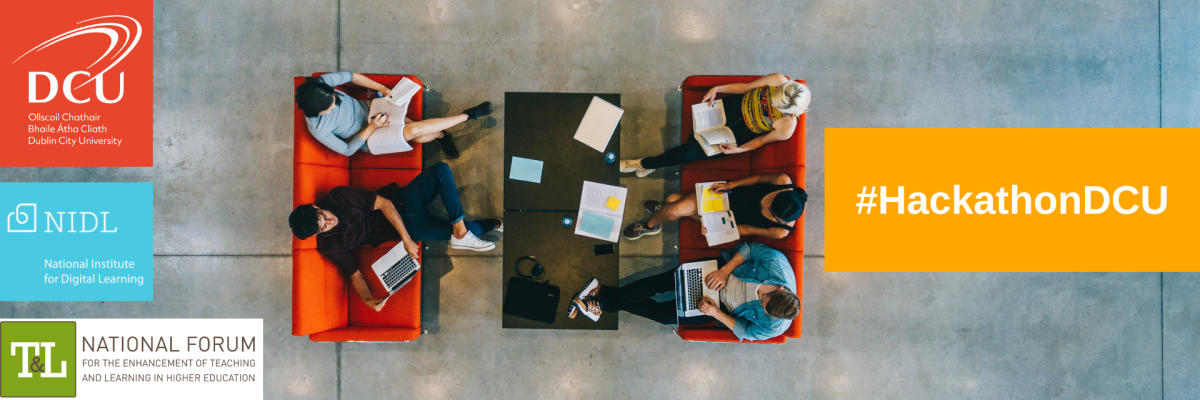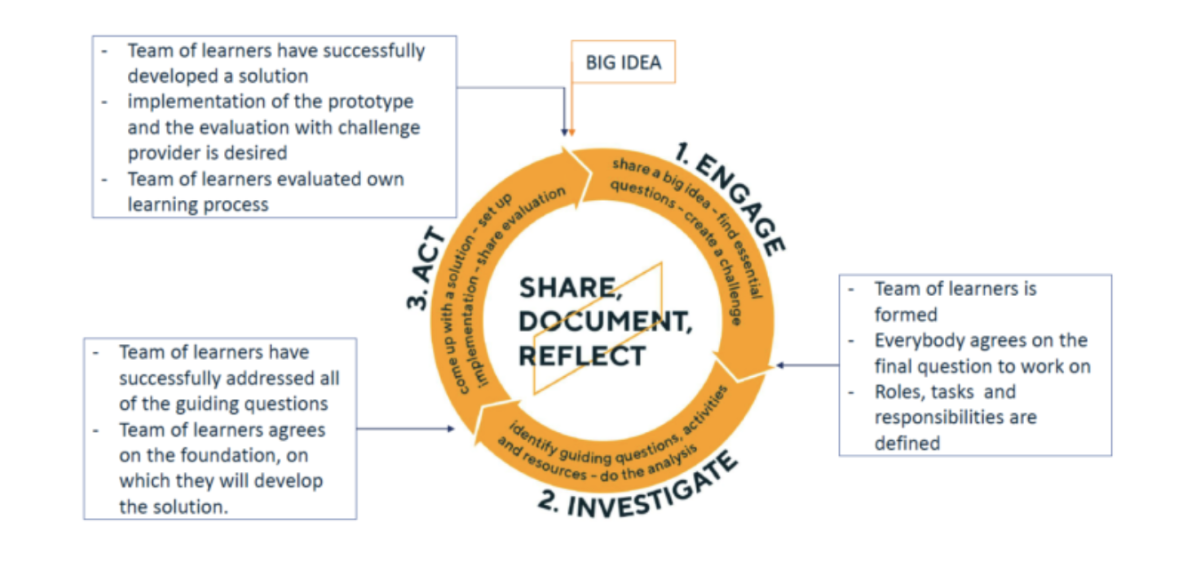

Hackathons
What is a Hackathon?
Hackathons are intense, time-bound events where people collaborate in groups to solve significant challenges or problems. They are increasingly being used in higher education as a means of enabling Challenge-based Learning (CBL)
A hackathon actively engages participants/students in a situation that is real, relevant and related to their environment, it involves defining a challenge and implementing a solution.
Hackathons usually follow the CBL cycle of Engage, Investigate and Act. Each phase is interrelated and elicits learning through the process of collaboratively working towards authentic solutions or recommendations. Hackathons are context-dependent and can be tailored to focus on only one or two phases depending on the learners’ needs, stakeholder requirements and availability of time and resources.

While the duration can vary from 1-5 days, hackathons tend to follow a broadly similar format based on the CBL cycle. Most begin with participants pitching their ideas and possibly outlining their areas of expertise. Once teams are formed, the challenge is refined and the teams investigate the problem to find an appropriate solution. The solution could be technical (such as a working prototype) or it can be based on a set of recommendations (such as a presentation or a report).
Throughout all this dynamic activity, participants are coached and guided by facilitators and mentors from industry or elsewhere who will help to tease out the solution, ask critical questions about audience and objectives, and direct teams to potential resources of relevance. At the end of the event, teams typically present their solutions to peers and often a judging panel.
Upcoming ‘Activating Active Learning’ Hackathon
The 'Activating Active Learning' hackathon is an exciting opportunity to participate in an education-related hackathon alongside colleagues, expert mentors, and students. The Hackathon will take place on Tuesday, 21 May 2024 from 9.30 am to 3.30 pm on the DCU Glasnevin Campus. The event is being organised for DCU staff who might be interested in hackathons and Challenge-Based Learning (CBL) but have yet to experience such approaches themselves. It is a chance for the staff to engage with and investigate a range of active learning possibilities while gaining hands-on experience in the CBL format. There are a varied range of Challenge topics including Education for Sustainable Development (ESD), Active Learning, Academic Integrity, and Digital Transformation. The participants are encouraged to pitch authentic challenges from their experience.
The event is being organised by the Teaching Enhancement Unit (TEU), DCU Staff can contact organisers Clare Gormley and Lily Girme in case they need further information. Staff can register via registration emails sent out by the Teaching Enhancement Unit.
Why Hackathons?
Broadly, Challenge-Based Learning falls under Pillar 1 of the DCU Strategy 2023-2028. Pillar 1 of the institutional strategy focuses on developing curriculum, teaching, distinctive learning experiences and opportunities. One component of Pillar 1 ‘Excellence’ highlights continuing to innovate curriculum with a focus on excellent, distinctive teaching, learning, and assessment. This is significant because CBL is being embedded as a core pedagogical innovation in DCU Futures, the flagship programmes at DCU, and a growing number of other programmes across DCU. DCU is committed to exploring new innovative pedagogies, including using Sprint and Hackathon methodologies for educational purposes.
Each year, for example, the DCU Business School offers a Hack4Change Hackathon. The recent iteration of which had around 800 students from the DCU Business School and Futures programme. The large-scale Hackathon had 13 speakers and around 50 mentors with representatives from Dublin City Council and Deloitte. The hackathon featured industry mentors and DCU staff offering feedback and insights on proposed solutions linked to sustainable development goals (SDGs).
Another notable recent hackathon was held in March 2024, with 14 teams of students from the Faculty of Engineering and Computing, Faculty of Science and Health and Faculty of Humanities and Social Science. This inaugural ‘FIRST® LEGO® League’ Hackathon was hosted by the DCU Faculty of Engineering and Computing in partnership with the DCU Engineering Society and CreativeHUT, supported by PWC.
DCU Assessment Hackathon 2022
Relatively few educators have had a chance to experience a Hackathon for themselves. In May 2022, 50+ members of a group of DCU staff joined forces to hack the following big idea: How can we design an authentic and sustainable assessment experience for all?
The practicalities and impact of this event are described in the Irish Journal of Academic Practice article ‘Running a Hackathon for Academic Staff: A case study from DCU’ (O’Riordan and Gormley, 2023).
Explore the below links to learn more about DCU Assessment Hackathon 2022
